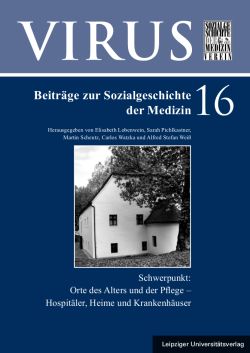 Daniela Wagner
Daniela Wagner
S. 273 - 292
doi:
10.1553/virus16s273
doi:
10.1553/virus16s273
Abstract:
Life, visit and work in old people’s and nursing homes is developed between individual needs and institutional requirements. (Socio)Demographic factors have led to a growing need for professional care and care for aging people. Processes of institutionalization and professionalization were and are the results. Led by the interest in mutual assistance and cooperation in Austrian old people’s and nursing homes I conducted qualitative interviews with the residents, their relatives and the nursing staff as well as the management of the homes in Styria and Vienna. Based on grounded theory a conditional structure emerged, which found its starting point in the historically grown framework conditions. The gap between the demands of medical care and life-world orientation is expressed in the current design of the areas of care, social contact, recreation, food and drink as well as spatial and material design. This contribution shows a historically grown “effect spiral” as a result.
Grounded Theory approach, narrative interviews, old people’s and nursing homes, medical care, life-world orientation, Austria, historical impacts, current claims
Published Online:
2020/07/22 21:22:41
Object Identifier:
0xc1aa5576 0x003bb5d9
Rights:https://creativecommons.org/licenses/by/4.0/
Die Zeitschrift "Virus - Beiträge zur Sozialgeschichte der Medizin" ist das Publikationsorgan des Vereins für Sozialgeschichte der Medizin und erscheint einmal jährlich.
Sie versammelt wissenschaftliche Beiträge verschiedener Disziplinen, die sich mit Themen aus den Bereichen Medizin, Gesundheit und Krankheit in historischer, kultur- und/oder sozialwissenschaftlicher Perspektive empirisch auseinandersetzen. Weitergehende Einschränkungen für Beitragsvorschläge in thematischer oder methodischer Hinsicht bestehen nicht.
Der "Virus" publiziert vornehmlich Beiträge mit Bezug zur Geschichte der Medizin in Österreich, dessen Nachbarländern sowie der ehemaligen Habsburgermonarchie. Vergleichend angelegte Arbeiten können aber über diesen Rahmen auch hinausgreifen. Hinsichtlich der behandelten Zeiträume bestehen keine Eingrenzungen, jedoch stehen Beiträge zur Medizin in der Neuzeit und der Moderne/Postmoderne im Vordergrund (16.-21. Jahrhundert).
…




 Home
Home Print
Print
 References
References
 Share
Share
 Daniela Wagner
Daniela Wagner